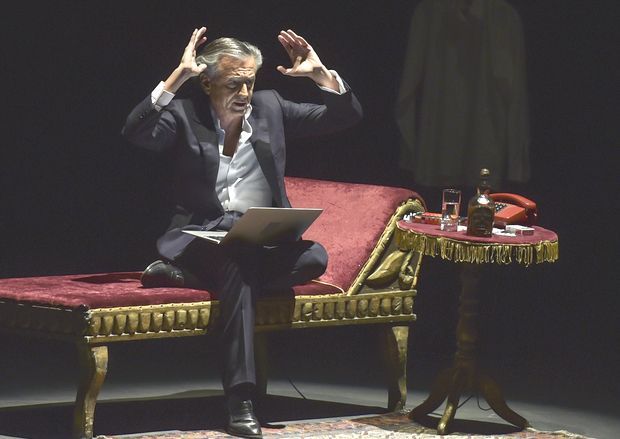Maidan, equality, fraternity
Hotel Europe by French playwright, author, and philosopher Bernard-Henri Levy, dedicated to the anniversary of our revolution, performed at National Opera
Bernard-Henri Levy (66) is a French philosopher, writer, journalist, and cofounder of the New Philosophers. He has authored more than 20 books, mostly on burning political issues. Levy criticizes both the contemporary Marxism and the extreme right, pro-fascist forces, and is a principled opponent of totalitarian regimes and religious fanaticism. In the 1990s he was covering the conflicts in Yugoslavia, defending Bosnian Muslims and the Albanians of Kosovo. During the war in South Ossetia, 2008, he reported from Georgia. Levy supported the Winter Revolution from the very start, and spoke on Maidan.
Hotel Europe is his reflections in the form of a monolog, which rests on two issues, two European challenges, Bosnian and Ukrainian. The author and protagonist, actually Levy himself, is voluntarily confined to a hotel room in Sarajevo, where he is trying to write a speech commemorating the centennial of the First World War. The work is not getting along, for the lessons of that war and the war in Bosnia were never learned.
The author’s message is that Europe is losing its raison d’etre as it gave up the values of liberty and democracy and allowed the deaths of so many Bosnians, and now allows killings of Ukrainians. Europe is poisoned with the musty air of Munich in the 1930s and the betrayal of allies. This is a Europe where corrupt nationalists, led by Marine Le Pen and her ilk, are getting more and more clout and where economy is in the hands of avaricious and unscrupulous bankers.
“You cannot call Hotel Europe a proper play. Levy is no actor: he cannot make effective pauses or render his emotions in gestures or mimics, but this is not about acting. He did what he is best at: giving a lecture. Hotel is nothing but a lecture with some stage elements: slides and captions in the background, recorded music or sound effects, switching beams of spotlights which outlined the boundaries of the symbolic hotel room with its sparse furniture. Levy mostly sat at the desk behind his notebook, sometimes lay down in a big bath tub or on a sofa, and kept saying his lines. The text is what matters.
This play is the author’s attempt to imbed the Ukraine he sympathizes with into Europe on all available levels, from historical to mythological to current political. Levy’s imaginary Europe resembles a sort of cultural and political Elysium, where Bohdan Khmelnytsky stands between Camus and Virginia Woolf, Serhii Nigoyan rests in a pantheon next to Pasolini, Alberto Moravia, and the anti-Bolshevik rebels from Kronstadt.
It is not that Europe can save Ukraine; it is Ukraine or Bosnia that can save Europe. They have the “revolutionary vaccine” which the Old World lacks. “Draw a little Kyiv or Sarajevo in an eye pipette and drop into each of those agonizing European institutions.”
What makes this performance an event is the energy of expression, the tense throbbing of the thought, the stream of disturbed consciousness of a Cartesian intellectual who keeps his distance from events so that he can see them with all their repercussions, and who introduces new values in his usual cultural landscape.
Maidan is such a value for Levy, and in fact, another definition of any European’s most valuable concept: freedom.
P.S. Speaking of European values, we cannot do without an unpleasant postscript. A lot of spectators (ordinary citizens, unlike the politicians, stars, or government officials who sat in the stalls) got seats on the balconies in the second and third tier. It looked like this unprivileged public was simply forgotten. From their places they could not see the subtitles of translation from French (special thanks to Iryna Zaitseva), projected on the backdrop. Besides, there was not a single leaflet with the translation in tier three. Thus a large part of the spectators could not fully enjoy the performance. We do not suspect anyone of malicious intent: it was most probably just the failure to take into account the specific features of this particular house, due to the preoccupation with the play’s entourage or something else. Yet this is a separate little lesson: Europe is not only about freedom and respect of individual, but also about the quality of work.






